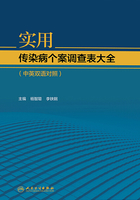
Section 10 Dengue Fever

Introduction of Dengue Fever
Dengue fever is an acute infectious disease caused by dengue virus,which is transmitted via the bites of infected mosquitoes. Symptoms usually begin on the 3-14 day after infection,including high fever,headache,vomit,muscle and joint pain,and characteristic rash. Recovery generally takes 2-7 days. For some cases,the disease can develop into lifethreatening dengue hemorrhagic fever characterized by high fever,severe bleeding,thrombocytopenia,plasma leakage,or develop into dengue syndrome with hypotensive shock.
Dengue fever is mainly spread by the bites of Aedes aegypti and Aedes albopictus. The virus has five different serotypes,infection with one type usually gives lifelong immunity to that type,but it only produces short-term immunity to other types. Subsequent reinfection with other serotypes may increase the risk of serious complications. Diagnosis of dengue fever can be confirmed by detecting viral RNA or specific antibodies.
登革热流行病学个案调查表



续表

续表

续表

Epidemiological Questionnaire for Dengue Fever

Questionnaire




continued


(本节编者-陈宗遒 本节核对-孙艺)